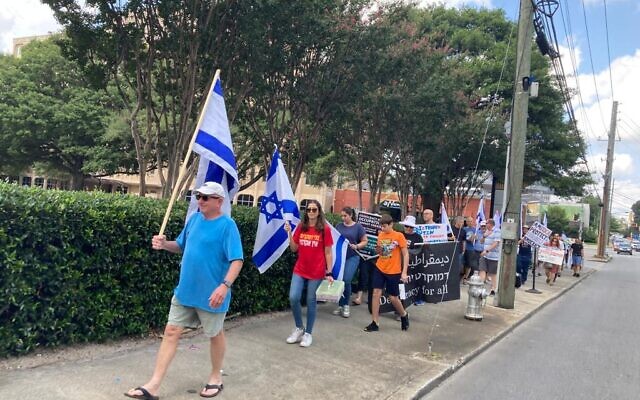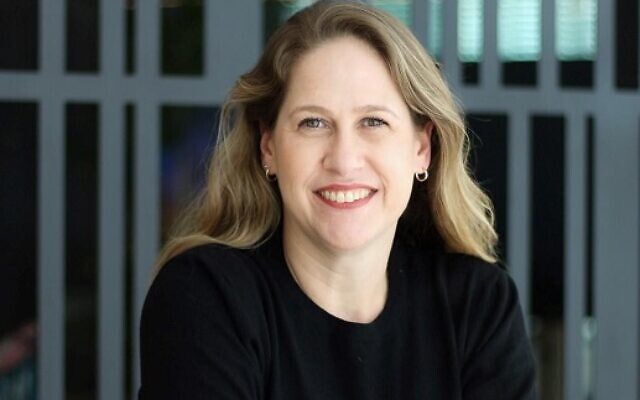Local Congregations Plan Sukkot Programs Focused on Israel
In first time, Israeli protest leaders will lead informative conversations.

In a groundbreaking move, several Atlanta rabbis have invited Israeli organizers of the local grassroots protest movement to speak to their congregants and the wider Jewish community during Sukkot, one of three Jewish pilgrimage holidays but one that places special emphasis on hospitality.
The “Atlanta Israel Democracy Sukkot” program is the brainchild of Israeli American Dotan Harpak who told the AJT that the idea started percolating in his mind over the summer when he was in Israel and attended several of the widespread weekly protests that have consumed the country since January. The protests, which have unified hundreds of thousands of Israelis from the high tech, medical, academic, military, economic, LGBTQ, religious, secular, left-wing and right-wing communities, are focused on concern that Israel’s democracy is being weakened by the agenda of the current Israeli government led by Prime Minister Benjamin Netanyahu.
When Harpak told fellow protesters in Israel that the Atlanta Israeli and Jewish community had been conducting their own protests in support of Israel’s since February, he heard overwhelming appreciation by the Israelis.
In Atlanta, Harpak noted an increasing number of Jewish non-Israelis participating in the local protests, most recently on Sept. 10 when the group marched – for the second time – from the Jewish Federation of Greater Atlanta’s building down Spring Street to the Consulate General of Israel location. But he also realized that there are a lot of questions among Jews who don’t constantly keep up with the Israeli news and “don’t understand what’s going on.”

“It might seem like just another political crisis in Israel, like we’ve seen the last few years, but this is about the very soul of Israel. The idea behind the Sukkot program is to create a safe and welcoming space to have an open and honest conversation” about what is happening in Israel, he said.
He likened it to the sukkah itself. “It’s a delicate structure and place in which we build trust and community,” he said. “It’s delicate and fragile like Israel, and American Jews want to keep visiting it, but a strong gust of wind can make it disappear. The sukkah is a place to talk to people about what we fear and what it means to the people in Israel from various communities in Israel. And it feels like the right place to have this conversation.”
The congregations that are opening their sukkot for the program both to their congregants and to anyone in the Jewish community cut a broad swath across Atlanta, from various streams of Judaism. “We’re proud of our local community to see this many congregations who want to take part and who have different perspectives on Israel. It’s heartwarming to see these congregations opening their doors to us. I understand that they want to engage their congregations in these conversations,” said Dotan, who added that he’s unaware of any other city doing this kind of program.
Among the congregations that are participating in the program are Congregation Or Hadash at 12:30 p.m. on Sept. 30, Congregation Shearith Israel, at noon on Oct. 3, The Temple later that evening at 7:30 p.m., and Temple Sinai on Oct. 6 at noon. The wider list of congregations was not complete at press time, however, Harpak said Atlantans can get the latest details at Atlanta for Democracy on Facebook and WhatsApp.

“We always keep Israel front and center at Sinai, and we’ve been covering the proposed judicial overhaul since the beginning with many sessions, sermons, and writing dedicated to it. When approached by this grassroots group of Israelis looking to partner with local synagogues during Sukkot, the fit was logical. Sukkot is such a meaningful festival, one that symbolizes fragility, fleetingness, and gratitude. Sitting in the sukkah and discussing Israeli current events through this lens seemed liked a wonderful way to spend some of the holiday,” said Sinai Rabbi Natan Trief, director of adult learning.
Harpak emphasized that the sukkot program is the first Israeli-led program to reach out to Atlanta congregations. He sees the issues that are shaking the populace of Israel as “completely different” from other issues that have divided the country, “so the way we address it must be different than ever before. The way we talk about it and mobilize must be different.”
His perspective is echoed by one of the Israeli American organizers of the local protest movement who will also be leading some of the conversations in the congregational sukkot. “This is not a right or left issue,” said Meirav Mayer. “The organizers have different opinions about political views. In Israel, some of the protesters voted for Netanyahu. This is not a pro or against Netanyahu movement. He’s been prime minister for years.”
Mayer said that while Israelis have been protesting for 36 weeks straight, it is time for the organized American Jewish community to speak up. “Some rabbis say they feel they have to support Israel, right or wrong, but we’re supporting Israel, just not the government. We’re supporting a Jewish and democratic Israel,” said Mayer. “We’re supporting the ‘start-up nation’ that will no longer exist if all the proposed laws are passed.”
The Netanyahu government announced its plans to overhaul the country’s judicial system in January, just weeks after the coalition government was formed. Since then, the military and economic picture has darkened. Thousands of voluntary reserve members in Israel’s army have announced that they won’t report for duty, weakening especially the country’s vaunted air force.
Then, in early September, the Israeli Finance Ministry reported that foreign investment in Israel dropped 60 percent in the first half of this year. An organization that tracks Israel’s technology industry reported it had seen a 29 percent decrease in private funding in the industry in the first half of 2023 compared to a similar period in 2022. Initial public offerings and mergers and acquisitions also hit a five-year low. The Israeli shekel has declined to its lowest level in years, at 3.85 to the dollar.
This month, the Israeli Supreme Court is scheduled to consider several petitions filed against the overhaul legislation that has already passed the Israeli legislature, controlled by Netanyahu’s government.
- News
- Local
- Jan Jaben-Eilon
- Sukkot
- Atlanta Israel Democracy Sukkot
- Dotan Harpak
- Prime Minister Benjamin Netanyahu
- jewish federation of greater atlanta
- Consulate General of Israel
- sukkah
- Congregation Or Hadash
- Congregation Shearith Israel
- The Temple
- Temple Sinai
- Atlanta for Democracy
- Rabbi Natan Trief



comments